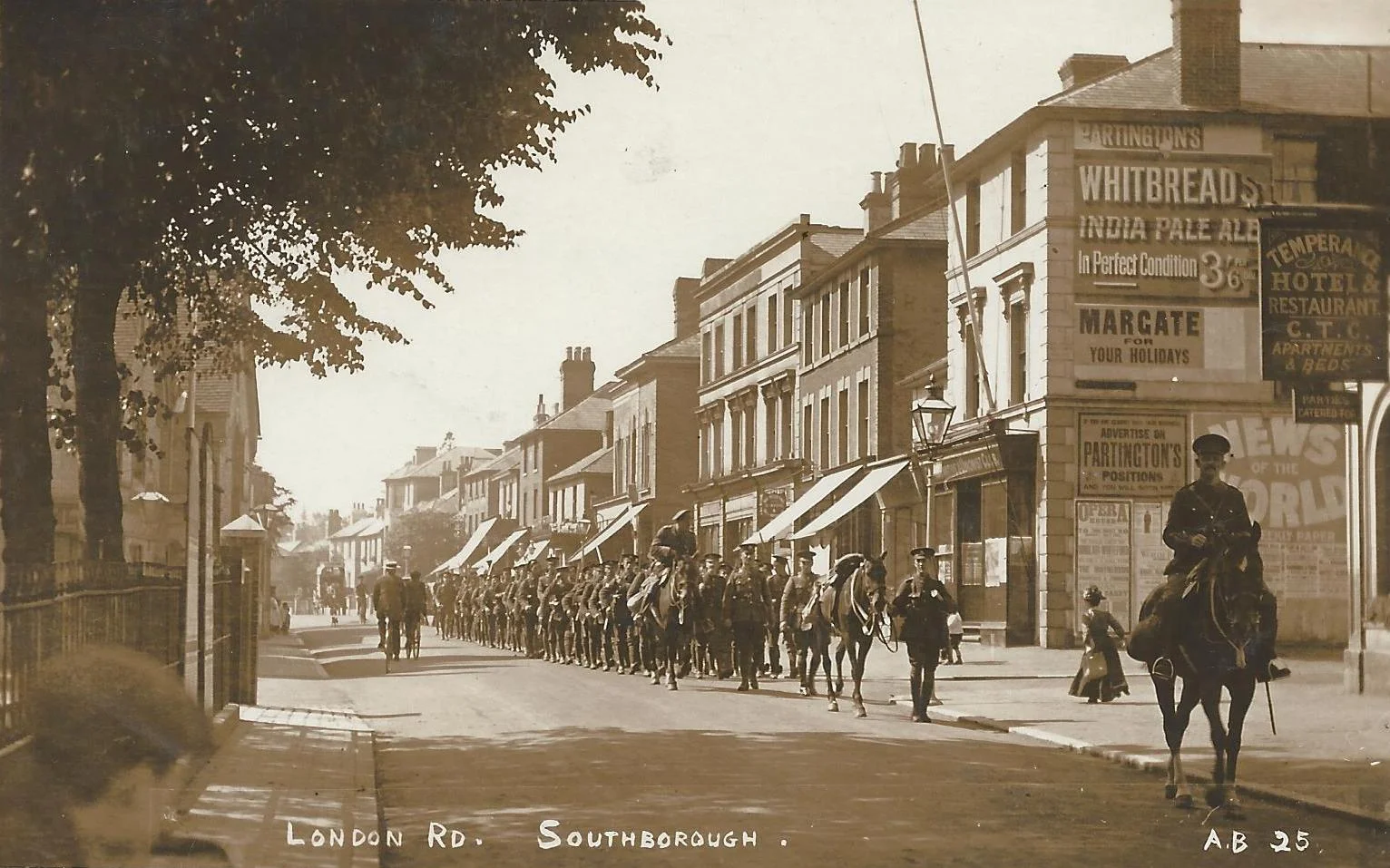Southborough's Sappers
by Fiona Woodfield
View looking down High Street towards Tunbridge Wells
In early 1914 there seems to have been more than just a hint of conflict in the air in Southborough and High Brooms. The recently formed Territorial Army unit the Kent Fortress Engineers - colloquially the Sappers - was already at full strength.The company included a band of forty five musicians - both a brass band and a drum, fife and bugle band. There was also a cadet company for the yougsters of the town. In February 1914 the company held a celebratory engineers' dinner the Royal Victoria Hall with their patron Sir David Salomons as the speaker - he was Lieutenant in the main company and the Captain Adjutant in the cadet section.
In the early months of 1914 the engineers' company and the cadet section were kept busy with various activities across every weekday evening. Skills learnt included rope work with knotting, splicing and lashing. Some were of a very practical nature, such as an exercise by the men of the company in early May constructing a suspension bridge. In June the Courier photographed the cadet section during their camp, showing off their practical skills, constructing a single lock bridge.
The men of the company did not just learn the practicalities of military engineering but were encouraged to sport a fine military image. Regular band parades were held, for example in St. Matthew's Church and at the Royal Victoria Hall with the men attired in their "walking out" dress uniform, complete with bayonets.
In April 1914 the company band held a successful concert at the Royal Victoria Hall. The matinee concert was evidently the more popular with tickets priced at 3/-, 2/- and 1/- (15p, 10 and 5p) whereas the evening performance was a more modest 2/6d, 1/6d and 6d. The company's special guests on that occasion were the Band of the Seaforth Highlanders. A remnant of this historic military band is still in existence, based - rather bizarrely - in Leicestershire.
In May 1914 the Southborough men joined an outdoor camp held in Dover, parading off smartly to board the train at what was then still known as Southborough Station. The Courier account indicates that safety was very much to the fore, with the detail that everyone should have fired off their musketry on the outdoor range before camp.
By the middle of the year, both the men and the women of the town were preparing for war. In June both sexes were involved in Territorial Army Week. The Red Cross Voluntary Aid Detachment nurses from Southborough took part in a display at Tonbridge Castle, demonstrating first aid, stretcher work, dressing of wounds, preparation of beds and shelters. Less than two months later those women would find themselves on standby for the start of the war.
Not all in the town were in favour of war. At the end of June the National Service League held an open air meeting near the High Brooms Hotel ( now The Brickworks public house). This organisation was of the view that people should be trained merely to protect their own homes and farms and that the army should be defensive not offensive (neither to be sent abroad nor used to put down strikes).
Image courtesy of Southborough News
The Southborough Territorials marched off to war on the morning of Wednesday 5th August, bound for Sheerness and carrying one day's ration. The local post office had been open all through the night before. With post offices providing financial services, this flurry of activity was, in all likelihood, the men putting their affairs in order. The Courier coverage of the outbreak of the war in its 7th August 1914 edition records that a good number of the town's residents were present at the Drill Hall in Speldhurst Road "to wish them God speed". As the men marched off towards Tonbridge Station, the school children of St. Peter's School lined up on the Common by the Hand and Sceptre singing the national anthem. All VAD nurses had been put on standby and four Southborough special constables had been called up to fill gaps in the regular police force as police officers who were army reservists went off to war. For the people of Southborough and High Brooms, the war had begun.



